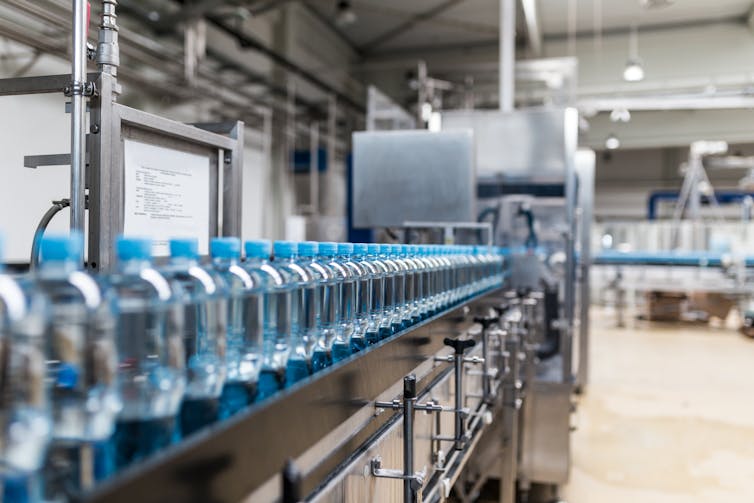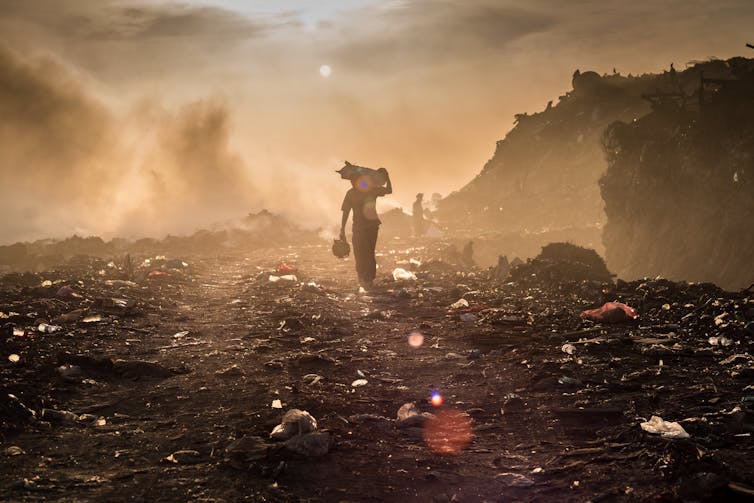A global plastic treaty will only work if it caps production, modelling shows
But how the world will get to zero pollution is still uncertain – and production caps are untested.
An international agreement to end plastic pollution is due to be sealed this year in Busan, South Korea. At the penultimate round of negotiations, held in Ottawa, Canada, Rwanda and Peru proposed a target to cut the weight of primary plastics produced worldwide by 40% by 2040, compared with 2025.
This is the first time that a limit on the production of plastic has been considered at the UN talks aiming to develop an international legally binding instrument to end plastic pollution. Of the potential mechanisms for tackling plastic pollution, a cap on plastic production was the most hotly debated, but one has not made it into the draft text of the treaty – not yet, at least.
However, all efforts to scientifically model the extent of plastic pollution in the future assume that restricting how much plastic the world makes each year will be necessary (among other measures) to curb its harmful presence in the environment. In a 2020 study I co-authored, my colleagues and I found that primary plastic production – the creation of new synthetic polymers, largely from fossil fuel – will need to be 47% lower in 2040 compared with the rate measured in 2016.
This scenario would involve plastic production falling by as much as our research team considered practicable. It would predominantly mean everyone using significantly less plastic and substituting it with paper and materials that are compostable.
Cutting production almost in half and using all other strategies, such as ramping up recycling and disposing of plastic waste in landfills or via incineration plants, would still leave residual pollution in 2040. In fact, just under 50 million tonnes of plastic would still be flowing into the ocean and rivers each year or accumulating on land where it may be burned in the open and create even more pollution.
In a 2022 report, the OECD estimated that cutting demand for plastic by 33% relative to 2019 (and enhancing recycling alongside preventing plastic escaping the waste management process) would almost eliminate mismanaged plastic waste by 2060 – that is, plastic that end up as pollution in the environment.

A combination of measures such as these is considered the most effective scenario in cutting pollution. Again though, the OECD model projects slightly over 50 million tonnes of plastic waste being mismanaged annually in 2040. For the accumulation and burning of plastic in the environment to stop, we would have to wait another two decades.
A simulation conducted in 2023 set an even more ambitious target for eliminating plastic pollution by 2040. In it, a cap on production was an essential element alongside 15 other global policy measures which could cut annual mismanaged plastic waste by 90% and virgin plastic use by 30% yearly by 2040, compared with 2019. This would represent a 60% reduction relative to 2040 levels without restrictions on production.
The 40% reduction target floated in Ottawa is generally consistent with what these models suggest is necessary to substantially reduce plastic pollution in coming decades. Whether such a production cap is plausible however is still poorly understood. With plastic production still increasing, it is unclear what policies would reduce it so steeply in just 15 years – and what their side effects might be.
What will it take?
Reducing plastic production would require marked shifts in our lives for which there is little precedent. It could involve massive changes in how we behave as consumers, how products are designed and delivered to us – and so on.
A 40% production cut would probably entail slashing the amount of packaging and single-use plastic made worldwide. These shortlived products account for around half of all plastic production and become waste quickly. Essentially, this would reverse the trend in material use since the mid-20th century.
Every year without production caps makes the necessary cut to plastic production in future steeper – and our need to use other measures to address the problem greater.
Modelling the mess
The combination of policy and technical innovation necessary to eliminate plastic pollution is highly debated. But swingeing production cuts feature in all modelled scenarios.
A less dynamic pace of change is assumed to be necessary for “downstream” measures – those associated with when plastic becomes waste, such as during disposal and recycling. Some of the emphasis on production caps in models originates from the failure of existing waste management services to stop plastic from entering the environment or being burned outdoors.
Since between 1.7 and 2.5 billion people still lack waste collection, some form of reduction in the amount of new plastic made each year might seem attractive – and consistent with the idea of a circular economy and the waste hierarchy, which prioritises waste prevention.
Research I worked on recently showed that a country’s waste management performance is strongly linked to its socioeconomic development. The collection, recycling and disposal of plastic will only prevail as a solution to the extent that countries improve socioeconomically. Clearly, without radical change, the pace of progress on this front would not solve plastic pollution by 2040.
What is ironic, and illustrative of how daunting the challenge is, is that deploying sound waste management to the under-serviced is one of the few solutions that we understand relatively well, based as it is on commercially and technically proven technologies and operational systems.
By contrast, the three models offer only generic insight into what would be necessary to scale down plastic production. Replacing plastic with paper and card would not fundamentally improve matters if this packaging still ended up as waste being burned in the open.

There are other options, though. It could be possible to massively simplify the types of polymers used in packaging so that just a few are in circulation. This would make recycling more effective, as one of the present complications is the huge variation in materials that leads to cross-contamination. Likewise, countries could massively expand systems for reusing and refilling containers in shops.
No matter the degree, pathway and pace of plastic production cuts, a fundamental change in our relationship with plastic is necessary. As a target, 2040 seems impossibly close for a viable pathway to significantly lower production, but that should not stop us entertaining such a future. It should alert us to the scientific advances and innovation necessary to make it more plausible.
Let us think of it as a worthy investment of our resources and effort – one that we rely upon for a better future.

Don’t have time to read about climate change as much as you’d like?
Get a weekly roundup in your inbox instead. Every Wednesday, The Conversation’s environment editor writes Imagine, a short email that goes a little deeper into just one climate issue. Join the 30,000+ readers who’ve subscribed so far.
Costas Velis consults for organisations active in the waste, resources and circular economy sphere. He receives funding from UKRI, GCRF, NERC, ESRC, BBRSC, Royal Academy of Engineering, British Council, Innovate UK, EC H2020, World Bank Group, OECD, GIZ, UN-Habitat, UNESCAP, UNOPS, The PEW Charitable Trusts, IGES, ISWA, Grid-Arendal, Swedish EPA and SYSTEMIQ. He is affiliated with International Solid Waste Association (ISWA), The Scientist's Coalition for an Effective Plastics Treaty and the Innovation Alliance for a Global Plastic Treaty. The University of Leeds has memorandums of understanding with the Alliance To End Plastic Waste and the United Nations Environment Global Partnership on Plastic Pollution and Marine Litter (GPML) which refer to plastic pollution databases.
